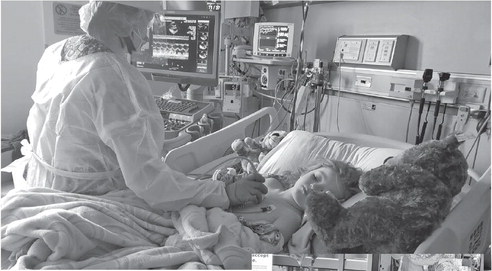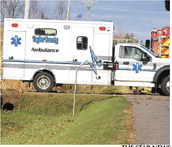COVID complication lands 4-year-old in PICU


Four-year-old Lily Lavin was fighting for her life after complications from COVID-19 landed her in a pediatric intensive care unit over the holidays.
Lily is the daughter of Misti and her husband Mitch Lavin of Hazelhurst and granddaughter of Al and Laura Ching of Stetsonville and Amy (Lavin) and Tim Koepke of Tomahawk.
Lily came home from the hospital on Monday after spending more than a week there battling Multisystem Inflammatory Syndrome in Children (MIS-C), a rare complication of COVID-19.
According to the Centers for Disease Control and Prevention (CDC) MIS-C is a potentially deadly condition where different body parts can become inflamed, including the heart, lungs, kidneys, brain, skin, eyes, or gastrointestinal organs. Children with MIS-C may have a fever and various symptoms, including abdominal (gut) pain, vomiting, diarrhea, neck pain, rash, bloodshot eyes, or feeling extra tired.
Having a sick child and not knowing what is causing it or what you can do to make them feel better is every parent’s nightmare scenario and it is one that the Lavins lived through before doctors were able to get Lily the treatment she needed.
Lily’s battle has its beginning in late November. At the time Misti was infected with COVID-19 and recovered. Lily had not shown any signs of infection when Misti was sick, but doctors suspect that she had asymptomatic COVID-19 at that time as well.
Things appeared normal until December 30, when Lily came down with a low grade fever and stomach ache.
“We didn’t think too much of it but of course worried about COVID in the back of our minds,” Misti said.
On New Years Eve, Lily woke with a high fever which was reduced with a dose of Motrin. Misti said Lily was quickly back playing with her older sister.
The fever came back early that afternoon. This time it would stay and be another five days before they could get it under control.
According to Misti, as Lily’s fever continued to persist, she also started to complain of neck pain along with her belly pain. This soon progressed to vomiting and diarrhea. By Friday night, they struggled through most of the night to keep Lily’s temperature even any lower than 102 degrees. It was when Lily’s temperature shot above 104 that they began to get scared and knew it was time to get her seen.
“At that time, we described it as “the worst night ever,” little did we know what was to come,” Misti said.
On that Saturday morning, they took Lily to urgent care where she was evaluated with a barrage of tests, xrays and samples.
Misti says everything looked OK aside from some elevated inflammatory markers in her blood work which could be any number of things. They were ultimately, sent to the emergency room as doctors suspected a possible appendicitis based on Lily’s belly pain.
The emergency room doctor ruled out appendicitis and told them he suspected COVID. He did a rapid COVID test which came back positive.
“This positive test explained her symptoms and we were sent home with direction on comfort measures and told it could take some time but usually kids turn around quickly. Fortunately, Lily seemed to rest much better that evening and we were able to at least keep her temp between 100-101 range,” Misti said.
Lily’s fever spiked again that Sunday evening going above 104 degrees at times combined with vomiting and diarrhea. “Only after torturing her in a cold bath and packing her with ice packs were we able to get her fever down enough that she quit vomiting enough to keep some medications down,” Misti said.
A conversation with the on-call pediatrician assured them that Lily just needed some more time to fight off the illness. A follow up appointment was scheduled for Monday, Jan. 4.
Despite the initial optimism that Lily would soon turn the corner on the illness, once they got to her appointment they found things were more bleak than they anticipated.
Her labs showed that her inflammatory markers were much higher and she needed fluids. At this point the Infectious Disease physician from Marshfield Medical Center – Marshfield got involved. Once reviewing Lily’s chart and most recent labs, he immediately had concerns that she was showing early signs MIS-C. An IV for minimal fluid replacement was immediately placed and they were sent on their way to Marshfield for direct admission to Marshfield’s Children’s Hospital general pediatric floor.
“Though we had our concerns and anxiety about the whole situation, we were under the impression we’d be there for a night or two and back home soon,” Misti said.
“Our world completely changed almost as soon as we got to the hospital,” Misti said.
By that time, Lily continued to have a fever even with medication management and was more lethargic and weak than even just a few hours earlier. An echocardiogram showed signs of myocarditis, inflammation of the heart muscle. They were quickly transferred to the Pediatric Intensive Care Unit (PICU). Myocarditis is something that has been seen in a Primary COVID-19 infection in children.
At that point Lily’s parents could do nothing but wait and hope.
After the first line of treatment to combat MIS-C failed, doctors moved on to the second treatment increasing dosage. Misti and Mitch were told slow and steady progress forward is all they could expect.
Misti explains MIS-C is very rare, but what research is showing is that it shows up during a child’s antibody phase of the process which happens after the infectious period of COVID-19.
“This just goes to show that even when someone has no or little COVID symptoms; the consequences of simply contracting the disease can be life changing,” Misti said. “When Lily finally pulls through this, she will be a long-term cardiac patient.”
On Monday, after six days in the hospital watching as Lily slowly fought off the effects of her illness, Misti and Mitch were able to bring her home. In that time, they learned more about the condition that was threatening their child’s life.
Misti explains that Lily’s immune system fought COVID and once it was gone, her immune system didn’t know how to shut off, moving to work on her own organs/ tissues. This is what is called MIS-C. The medications that are given to fight MIS-C basically block the immune system from harming her own organs. If not for intervention with meds, with time MIS-C most likely would resolve, but the damage is unknown. This is why meds are given to prevent as much damage as possible.
Lily’s heart function continues to improve. Her echocardiogram on January 8 revealed that the cardiologist is very happy with her recovery and considers her heart function almost back to normal for her condition. They will have follow-up cardiology appointments for at least six months to make sure her heart fully recovers and be taking a beta blocker and other medication during that time.
The day also saw her moving out of the PICU onto the regular pediatric floor, with her spirit and energy levels increasing.
Misti thanks all those who shared prayers for Lily’s recovery and who sent warm thoughts. She said people must also be willing to do their part to prevent others from getting sick and other families from having to go through what they have had to endure.
“Mitch and I have done the very best we can to protect our family from COVID-19,” Misti said. “This just goes to show that it really isn’t so much about what we do, but rather what those around us are not doing. Please do your part to protect the next little kid from going through what our little Lily has had to go through in the past week and weeks to come. Wear a mask. Wash your hands. Get vaccinated.”
“Take COVID-19 seriously because it has seriously affected our entire world in a very short time,” Misti said.
A benefit fund has been set up for Lily Lavin through Nicolet National Bank and contributions may be made at any Nicolet Bank location or mailed to Nicolet Bank, Attn: Amanda Krueger, PO Box 54, Minocqua, WI 54548. Specify the “Lily Lavin Benefit Account.”






